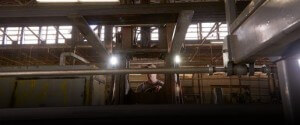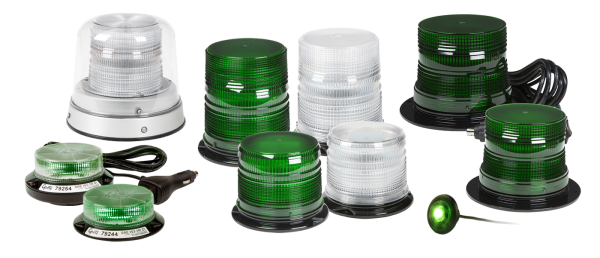Top 10 Reasons To Switch From Incandescent To LED Warning & Hazard Products.
Transitioning from incandescent lighting to the modern day Light Emitting Diode (LED) technology has never been easier. The technological advances over the past 5 years in warning & hazard manufacturing have vastly improved the overall safety, reliability and consumer options.
We’ve identified the top 10 reasons to make the move to LED technology now!
10: Modern Design
 Select models are low profile and non-evasive designs reduce the chances of products being accidentally hit or broken during use. Also provides a clean cosmetic look to any application.
Select models are low profile and non-evasive designs reduce the chances of products being accidentally hit or broken during use. Also provides a clean cosmetic look to any application.
 9: Increased Flash Patterns & Sequencing
9: Increased Flash Patterns & Sequencing
New technology allows the ability to sequence several LED lights together to help create a desired flash pattern or sequence.
8: Multi-Volt Options
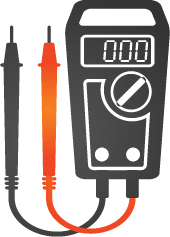 LED’s are available in multi-volt options. Traditional halogen bulb options are normally 12V or 24V. This allows the user to cover a broader voltage range in 1 product vs having multiple lights to achieve the same result.
LED’s are available in multi-volt options. Traditional halogen bulb options are normally 12V or 24V. This allows the user to cover a broader voltage range in 1 product vs having multiple lights to achieve the same result.
 7: Less Radio Interference (EMI)
7: Less Radio Interference (EMI)
Traditional Incandescent strobe lights use high voltage (over 300VDC) to generate the flash. The charging and discharging circuit generates more electromagnetic interference (EMI) than the lower-voltage switching circuit of an LED light.
6: Greater Range of Flash Pattern Options

The “instant on” nature of LEDs is much better suited for complex flash patterns. Halogen bulbs turn on and off slower than LED’s and are too slow for complex flash patterns.
5: More Uniform Light Output – Visibility
 Incandescent bulbs contain a filament that emits 360° light. With many traditional Incandescent bulbs up to 90% of the light emitted is wasted. LEDs by comparison, are directional. LED’s contain a small semiconductor chip that emits light in only one direction. With the addition of the reflector lens, the light projected from the LED through the lens provide a more uniform light output with much less wasted light.
Incandescent bulbs contain a filament that emits 360° light. With many traditional Incandescent bulbs up to 90% of the light emitted is wasted. LEDs by comparison, are directional. LED’s contain a small semiconductor chip that emits light in only one direction. With the addition of the reflector lens, the light projected from the LED through the lens provide a more uniform light output with much less wasted light.
4: Shock & Vibration Resistant

Traditional Incandescent bulbs have filaments and glass enclosures where bulbs and tubes are highly fragile. Prolonged vibration or physical impact on the incandescent light can cause premature failure. LED’s are manufactured using solid-state components-which are highly durable and difficult to damage. Even if one of the LED’s fail, the product can still output light and work until a replacement is available.
3: Higher Efficiency = Less Power Consumption

The amount of energy used to energize the flash tube in an incandescent bulb is much higher than in LED’s. Much of the energy generated converts to wasted heat. In comparison, LEDs generate much less heat so more electrical power is actually generating light. A reduction of energy needed provides a direct cost savings and frees up the electric power for other applications.Bonus: LED’s provide added protection from over and under current issues that may occur.
2: Longer Life
 LED’s lights are manufactured using solid-state technology (no moving parts). That means no bulb filaments to burn out or break. The solid-state technology extends the life of the product with virtually no replacement parts to stock or replace. Conventional Incandescent bulbs vary on their lifespan with LED’s averaging over 50,000 more hours of use. Grote also offers a 5 year limited warranty on select LED’s vs the one-year warranty currently available on incandescent lights.
LED’s lights are manufactured using solid-state technology (no moving parts). That means no bulb filaments to burn out or break. The solid-state technology extends the life of the product with virtually no replacement parts to stock or replace. Conventional Incandescent bulbs vary on their lifespan with LED’s averaging over 50,000 more hours of use. Grote also offers a 5 year limited warranty on select LED’s vs the one-year warranty currently available on incandescent lights.
 1: Ultimate Cost Savings!
1: Ultimate Cost Savings!
The advancement of LED technology has allowed manufacturers to reduce the number of diodes needed to achieve the desired light output on warning & hazard lights. The transition to stop producing incandescent lighting to more modern LED lights has changed the landscape of the products now available. The modern day advancements shown above include multi-volt, smart link syncing, longer life and high efficiency lights. This provides fewer replacement parts, reduced sku’s, longer service life and less downtime which provides significant cost savings.
Learn More:
To learn more, contact us today or speak with your Grote representative.
Download PDF
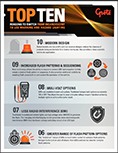 |
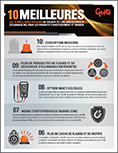 |
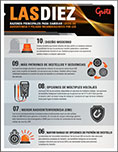 |
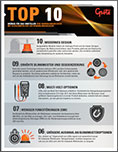 |
|---|---|---|---|
| English | French | Spanish | German |
09/24/2019











